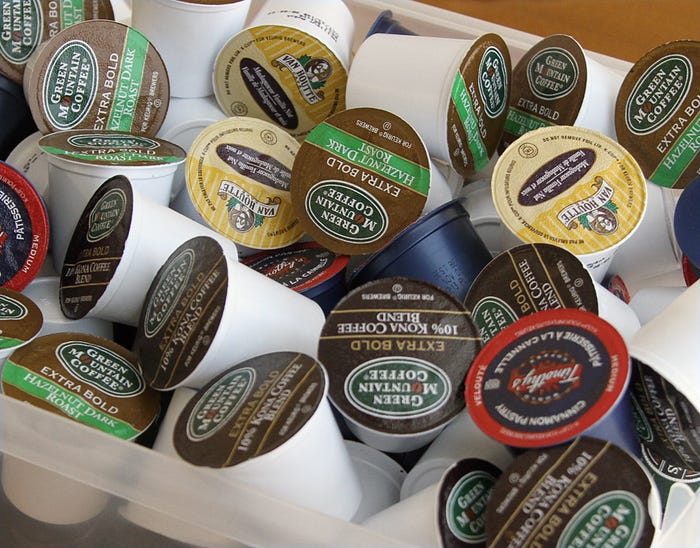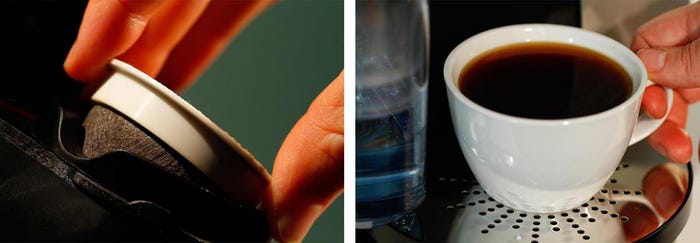Bioplastic suppliers look to offer consumers a sustainable caffeine fix
Green Mountain Coffee recently noted an 11% increase in K-Cup and portion pack revenue to $777.9 million. K-Cups, coffee capsules, whatever you call it, are in high demand. Worldwide sales of coffee capsules are estimated at about $10 billion, according to Euromonitor. I personally use a Keurig at home and we have one at the Denver UBM Canon office.
November 27, 2013
Green Mountain Coffee recently noted an 11% increase in K-Cup and portion pack revenue to $777.9 million. K-Cups, coffee capsules, whatever you call it, are in high demand. Worldwide sales of coffee capsules are estimated at about $10 billion, according to Euromonitor. I personally use a Keurig at home and we have one at the Denver UBM Canon office. It's quick, efficient and produces great tasting coffee - what's not to like?
 But it's not a perfect packaging story. The cups contain multiple layers: a plastic outer layer, a heat-sealed paper filters on the inside and a polyethylene-coated aluminum foil top. As a result, the cups can't be recycled as a whole unit.
But it's not a perfect packaging story. The cups contain multiple layers: a plastic outer layer, a heat-sealed paper filters on the inside and a polyethylene-coated aluminum foil top. As a result, the cups can't be recycled as a whole unit.
An estimated 9.1 billion single-serve coffee and drink cartridges wind up in U.S. landfills every year, amounting to some 19 million cubic feet of waste, according to some reports.
"The challenge of protecting the freshness of roasted coffee while using environmentally friendly packaging is one that both Keurig and the coffee industry are committed to overcoming," Keurig states on its website. "We are very sensitive about the waste created by the K-Cup packs and are investigating alternative materials. Finding a solution for this is a priority for us, and one we hope to have before long."
In the meantime, European bioplastic producers are hoping to gain market share with sustainable packaging options. For instance, Novamont says the rapid growth of this portion of the coffee market, involving coffee prepared using containers such as capsules, has created the need to find a suitable solution to the problem of disposing of these containers.
Using the company's Mater-Bi, a new family of biodegradable and compostable bioplastics, Novamont says it's possible to dispose of the various containers through separate collection of organic waste without having to separate the contents (the coffee) from the recipient.
"The polymers are based on various polymers, partially based on renewable resources," Stefano Facco, new business development director for Novamont, told PlasticsToday. "The new developed technologies might either replace partially some of the existing ones or support the development of new machines specifically developed to work with compostable capsules."
The compostability is ensured by the compliance to EN 13432 (European standard for compostable packaging). The advantage of using compostable polymers is the comparable behavior in terms of waste management of the content and its packaging, the company said. In such a way, the whole capsule may be composted, polymer and content.
Novamont says that injection molding, cardboard lamination and fiber production today makes it possible to produce rigid capsules, bondable filter papers, laminated cardboard capsules, film for sealing the capsules and packing solutions with suitable barrier properties for the specific requirements of coffee.
Facco said while the polymers are commercially available, the coffee capsule solution is still under development.
Biome Bioplastics recently developed what it calls a biodegradable coffee pod based on renewable, natural resources including plant starches and tree by-products. These bioplastics will degrade to prescribed international standards in composting environments.
resources including plant starches and tree by-products. These bioplastics will degrade to prescribed international standards in composting environments.
"Single-serve coffee pods are an excellent example of the fundamental role that packaging plays in delivering quality and convenience in the food service sector," said Biome Bioplastics CEO Paul Mines. "The challenge is to reduce environmental impact through packaging optimization without impacting on food quality or safety, or inconveniencing the customer. Bioplastics are an important part of the solution.
The company is working with manufacturing and brand partners to develop a number of natural polymer-based solutions for the hot drinks industry, with further announcements expected in the coming months.
It doesn't look like market demand for coffee capsules and cups are going away anytime soon - so we'll watch with interest the development of these bioplastic alternatives.
About the Author(s)
You May Also Like


